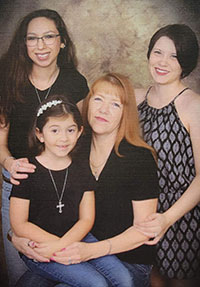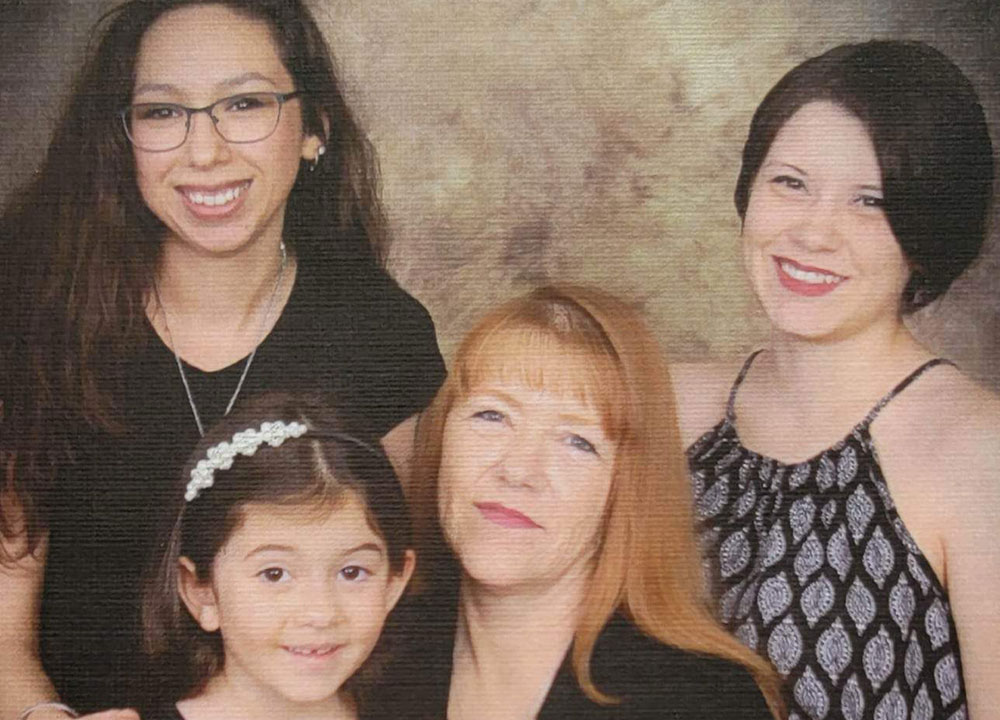The devastating inferno that struck Bastrop County in 2011 is considered the most destructive wildfire in Texas history. For Anita Rentfro, losing her home in that fire was the beginning of a series of family losses and challenges. Now age 52, and living in Paige, Texas, Anita has endured much.
In 2011, her family lost their home in the Bastrop fire. In 2013, her son passed away from an aneurysm. In 2018, her husband of 27 years, Beau, had four back-to-back cardiac arrests, was in a coma for 17 days, rehab for a month, and paralyzed on the left side of his body. While her other children are now grown and out of the house, Anita also had the unexpected surprise of raising another child, Willow, whom Anita lovingly calls “my little girl,” and has lived with their family since she was an infant.
While Anita was focused on everyone and everything around her, she wasn’t paying attention to herself and the warning signs of what turned out to be a devastating diagnosis of stage IV kidney cancer.
‘Hurts today, move on tomorrow’

Texas Oncology–Bastrop
Looking back, Anita realizes she should not have ignored her persistent symptoms. “I had a theory – hurts today, move on and tomorrow it would be better,” she says. “I was so caught up in everything happening in our world that I just put myself on the back burner.”
Back pain was a constant, but she attributed it to a car wreck injury. Other symptoms, such as a lack of appetite, an inability to keep food down, and intense stomach pain finally made her take notice. When the pain got to be too much in April 2021, Anita thought maybe it was a gallbladder issue, as those ran in her family. Her best friend took her to the emergency room, and during the CT scan, it was discovered she had cancer.
‘Hospice was a real possibility’
A week after receiving her diagnosis, she met Bartlomiej (Bart) Posnik, M.D., medical oncologist, at Texas Oncology–Bastrop. “When Dr. Posnik walked in the room, I immediately thought ‘I have children older than you!’” laughs Anita. “He was honest and optimistic, but at the same time, he was realistic about my diagnosis and didn’t sugarcoat the situation. In my mind, I was thinking how long do I have to make sure I can prepare my family for this.”
“Anita was diagnosed with a very aggressive metastatic cancer with a very poor overall prognosis,” says Dr. Posnik. Of the many types of kidney cancer, about 90% of cases diagnosed are renal cell carcinoma, according to the American Cancer Society. “She had diffuse metastases – stage IV in her lung, kidney, liver, and lymph nodes – and was not a surgical candidate nor a candidate for many therapies. Hospice was a real possibility.”
Dr. Posnik admitted Anita to the hospital to expedite her diagnosis and make a quick treatment plan due to how sick she was. He decided on leading-edge immunotherapy as the appropriate course of treatment. Immunotherapy uses a patient’s own immune system to help fight the cancer, attacking the “foreign” or cancer cells and leaving the normal cells alone.
“She was very clear from the beginning what her hopes and goals were – to get rid of her extreme pain and to meet her first grandson who was due in August,” says Dr. Posnik. “Despite limited options, we made a plan to get her to those goals one at a time.”
Anita received aggressive dual immunotherapy in June 2021 with a great response and was changed to single-agent immunotherapy in September 2021. She received all her treatment at Texas Oncology–Bastrop, which was very important for her to stay close to family. Dr. Posnik describes Anita’s case as a “borderline miracle story about the benefits of immunotherapy close to home.”
‘I was fighting two different battles’
Cancer took a tremendous toll on Anita’s body and she was violently ill. She lost all her strength and couldn’t stand, becoming wheelchair bound and spending most of her time in bed.
She was worried how all of this was affecting Willow, who had already endured so much in her short lifetime. “Willow would stay on the bed with me and would not leave my side,” recalls Anita. “I was scared when she fell asleep what she might find when she woke up.”
Eating had become one of the biggest challenges for Anita. The tumor in her stomach made it impossible to eat or drink, and her weight dropped to 80 pounds. “You could count every bone. I was fighting two different battles – one was cancer. One was starvation.”
She describes that time as the “pits of hell.” One day, Willow came in with a bowl of fruit. “She said ‘momma eat this, just try it,’” Anita remembers. At the insistence of a six-year-old who was set on force feeding her fruit, she ate one berry.
As the days rolled by, Anita’s strength started to return. The fear of Willow waking up to find her gone started to dissipate.

and her daughters
‘This is working’
After Anita began immunotherapy, the tumors started decreasing in size. She remembers Dr. Posnik calling her with the first CT results after treatment. “He said, ‘I wanted to tell you this now’ and told me about the reduction in tumor size. He was so positive, and you could hear the excitement. I told him this is working.”
Anita continues to receive immunotherapy infusions every two weeks. “She has improved to the point that she now has multiple other treatment options in the future if/when we need them,” says Dr. Posnik. Her most recent CT scans show continued reduction in all her tumors, and some are not even there anymore.
“I appreciate her continued optimism and positive personality,” says Dr. Posnik. “The love she has for her family was something we share, and every decision she made for herself had them in mind.”
Today, Anita is out of the wheelchair, is homeschooling Willow, watches her one-year-old grandson occasionally, and even took on the task of training a new puppy. “I can do what everybody else does,” she says. “The words ‘thank you’ just don’t seem sufficient. I am so thankful to my family, to my doctors, and to my phenomenal nurses. I could not have done this without them.”
‘Your fight is your own’
Anita knows her fight is not over. When reflecting on all she has been through, Anita says she is blessed. Even at her lowest point, she never lost faith. She encourages others to listen to their bodies, “It will tell you things, and you need to listen.”
“Cancer ravages your will – not just your body – and takes away every ounce of self-motivation you have,” says Anita. “It will do its best to destroy you, but it is okay to break down and lean on someone. It is okay to flat out scream. Do what you can to keep going each day. Your fight is your own.”
In Texas in 2023, an estimated 7,550 new kidney and renal pelvis cancers are expected to be diagnosed, and 1,320 Texans are expected to die from the disease. For more information, visit www.texasoncology.com.


